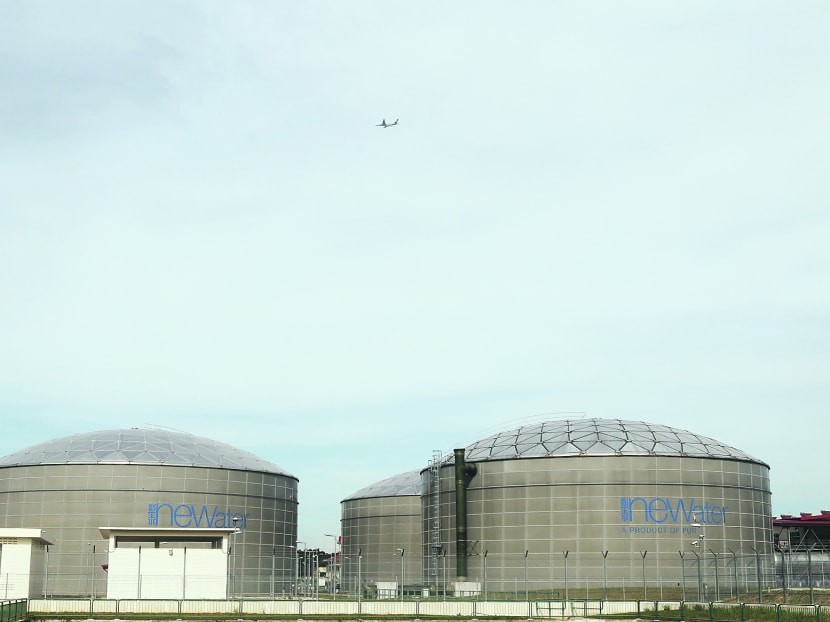S'pore must ensure adequate supply of water to meet growing needs 'by the 2050s'
SINGAPORE — The Republic must make sure it has an adequate supply of water to meet the growing needs of households and industries by the 2050s, before the expiry of the second water agreement with Malaysia, Minister in Prime Minister's Office Chan Chun Sing said on Saturday (Feb 24).

The Sembcorp NEWater Plant, Singapore's fifth water plant which was opened by Emeritus Senior Minister Goh Chok Tong. TODAY file photo
SINGAPORE — The Republic must make sure it has an adequate supply of water to meet the growing needs of households and industries by the 2050s, before the expiry of the second water agreement with Malaysia, Minister in Prime Minister's Office Chan Chun Sing said on Saturday (Feb 24).
Mr Chan was speaking at a Chinese New Year dinner for the Tanjong Pagar and Radin Mas constituencies, where he laid out the Government's long-term investments in infrastructure among other things.
Apart from major projects in the pipeline previously announced – such as the Singapore-Kuala Lumpur High Speed Rail (HSR), the Johor Bahru-Singapore Rail Transit System (RTS) Link and the Tuas mega port for example – Mr Chan also revealed that beyond the 2050s, Singapore will be "in full swing to redevelop the next generation of Housing and Development Board (HDB) flats".
This will ensure that every public housing estate is a "microcosm of Singapore with diverse age profiles and flat types to cater to the evolving needs of Singaporeans", he said. "We will overcome the current situation where we have an age gradient in our towns; from Tanjong Pagar on average, having the oldest flats; to Punggol in the north having the newest," he added.
The Government has previously said the country aims to be self-sufficient in water by 2060, and the issue has been described by national leaders as a strategic priority.
Stressing the need to be prepared, Mr Chan – who is among the front runners to succeed Prime Minister Lee Hsien Loong when he steps down – said: "This is why we are building the Deep Tunnel Sewerage System (DTSS) Phase 2 to recycle as much water as we can, and we will continue to explore collecting every drop of water that falls on Singapore soil," Mr Chan said.
Construction work for the second stage of the DTSS began last November. Estimated to cost S$6.5 billion, the work comprises the creation of a 100km underground "superhighway" to transport used water to water reclamation plants.
This will serve the western part of Singapore, including the downtown area and upcoming major developments such as Tengah Town and Jurong Lake District. When completed in 2025, the system allows 83ha of land to be freed up.
Mr Chan stressed that the Government is not making plans "just for the next few years in the short-term". "Instead, we have exciting plans for the next few decades," he said.
The HSR project is expected to be completed in the 2020s, along with the Johor-Singapore RTS Link and the Cross Island Line, he noted.
In the 2030s, the Paya Lebar Airbase will be relocated to Changi and Tengah, which in turn frees up the airspace restriction on the development of the entire eastern Singapore. The new Changi Airport Terminal 5 will also be up and running,and Singapore can think about redeveloping Terminals 1, 2 and 3 after which The Punggol Digital District and Tengah New Town will be completed as well.
Come the 2040s, the Tanjong Pagar and Pasir Panjang ports will be moved to the Tuas mega port, with operations being integrated. "Our status as air and sea hubs has enabled us to generate at least 10 per cent of our gross domestic product directly, creating many good jobs for Singaporeans. This is over and beyond the indirect benefits that our airport and sea port bring to the rest of the economy," Mr Chan said.
Further over the horizon, the Government is building "for the next 100 years" with investments in an underground electricity distribution network to "replace the ageing electricity network left to us by the British. Even as we speak now, we are reclaiming land to make sure that our reclamation can withstand the effects of global warming and the related rise in sea levels", he added.
"All these are plans for our future generations of Singaporeans," Mr Chan reiterated. "It is a testimony to our determination as a nation to continue to defy the odds of history to stay as an independent, sovereign and thriving country that will make Singaporeans proud to call home and welcome foreigners who wish to partner us."






